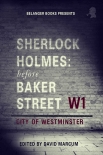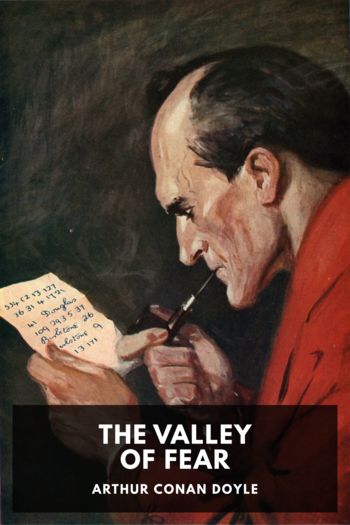Sherlock Holmes: Before Baker Street by David Marcum (books to read to be successful TXT) 📗

- Author: David Marcum
Book online «Sherlock Holmes: Before Baker Street by David Marcum (books to read to be successful TXT) 📗». Author David Marcum
Just as Escott bent forward, Flint leapt upon him, knocking the parrot to the floor in the process. The villain was grasping a fearsome knife and, holding his hand low, brought the six inches of steel up into Escott’s chest. I myself witnessed the knife pushed in all the way to the handle, a thrust that could not fail to penetrate the poor man’s heart.
Screams and shouts filled the auditorium, as a burly stagehand grabbed Flint from behind and pulled him away from Escott. The knife clattered to the floor, and I expected to see gouts of blood gush from poor Escott’s chest. Instead, he rose to his feet and with the calmest of demeanours faced a circle of raised brows and wide-open eyes.
“You – you’re all right then, William?” Nelly asked. “How can that be? I saw the knife enter your body.”
Hushed voices and bobbing heads echoed her observation.
“Sleight of hand,” Escott explained with a dry chuckle. “I suspected Flint from the start. He was already dressed and too eager to leave. I was able to check his pockets when I escorted him to centre-stage. I thought he might have concealed a weapon along with the missing wallet. I found no wallet, but encountered the knife. It was mere child’s play to substitute my prop with the retractable blade for the real item. He acted so quickly against me that he had no chance to detect the switch.”
Flint struggled all the more mightily to free himself – fortunately, to no avail.
“I can only assume such behavior confirms his guilt. Shall we see?”
Standing on sawdust that had been used to appear as sand, Escott had positioned himself a foot downstage from the trap door, the onstage egress to the storage room below the boards. Through just such an opening, many a dramatic entrance or exit has occurred. Shakespeare’s ghosts materialize from there, bodies are “buried” in its maw. Tonight, however, Escott seemed to believe it served as a cache for the stolen wallet, and raising the trapdoor, he ran his fingers round the moulding just inside the cavity.
“Bah!” he ejaculated. For inside that opening, he had found nothing. He searched again, but reached the same result. “It has to be here,” I heard him mutter just before he jumped down into the trap room.
I moved close enough to the opening to see the odd table, small bits of scenery, and a few colourful costumes lying about.
“No need for a thorough search in here,” he announced from below, his voice muffled by the subterranean enclosure. “Flint didn’t have enough time to be too clever.”
Escott climbed out empty-handed, and yet a look of genuine surprise appeared on Flint’s face. Almost immediately, however, it transformed into a broad smile.
“No wallet, eh, Escott?” he declaimed, squirming in the arms of his holder. He might have been orating in the midst of a play. “May I ask why you thought it was I who took it? Why you felt you could besmirch my good name in front of my dear colleagues?”
Escott looked momentarily puzzled. “In the world of detection, Mr. Flint,” said he at last, “there is much to be learned from observing trouser knees. Yours, sir, are dripping with sawdust, sawdust precisely the same as that scattered on the floor near the trap door. Anyone can see that you were on your knees by the opening.”
The stagehand let go, and immediately Flint brushed the legs of his trousers clean. “Proves nothing, does it?” said he.
Escott’s eyes turned back to scan the assembled actors. He was obviously seeking out yet another thief. Incidis in Scyllam cupiens vitare Charybdim. [From the frying pan into the fire.] Slowly, he scrutinised their appearances. If he could not produce an alternative culprit, I assumed that he and the young actress would have to search them all. But suddenly Escott turned to face white-bearded Bennie Gunn, the actor who had played a shipwrecked old sailor. He was still dressed in his costume of heavy blue cotton trousers and white billowing shirt.
“Do you mind, Mr. Gunn?” Escott asked.
Gunn looked quizzical as Escott examined the sleeves of the man’s shirt. Even I could detect the dark stains at the right cuff, which Escott was then sniffing. “Darjeeling, I should judge.”
Immediately, the man pulled his arm back and sprang for the stairs downstage that led to the auditorium and the exit. I saw Jones begin to rise in the back although I could not fathom what he might do if Gunn were actually to reach him. But the actor never even got to the steps. Another of the stagehands blocked his escape, grabbing him round his upper arms.
Escott now made his way to the dull brass samovar that stood on a table in the wings.
“This container is generally full of tea before a performance,” said he, resting his palm on the top, “and generally tapped out by the end.” So saying, he carefully raised the lid, peered inside, and nodded. “Dry,” he announced, “but not completely empty.” He proceeded to thrust his hand inside and plucked out a black leather wallet, which he held up for all to see.
“That’s it!” I cried, dashing towards him. “That’s mine. You can see my tickets inside – though not much else.”
Indeed, there was little money to attract a thief. But then a thief cannot detect a wallet’s contents in advance. Escott did produce what was in the wallet: My ticket for the next day’s evening-ferry to Jersey City, my railway ticket for travel from thence to San Francisco, and my cancelled ticket from the ship Devonia. There could be no doubt that the billfold was mine.
“Well done, Escott,” said I as he handed it over. To the man’s great embarrassment, the entire theatre company broke into applause.
“You





Comments (0)